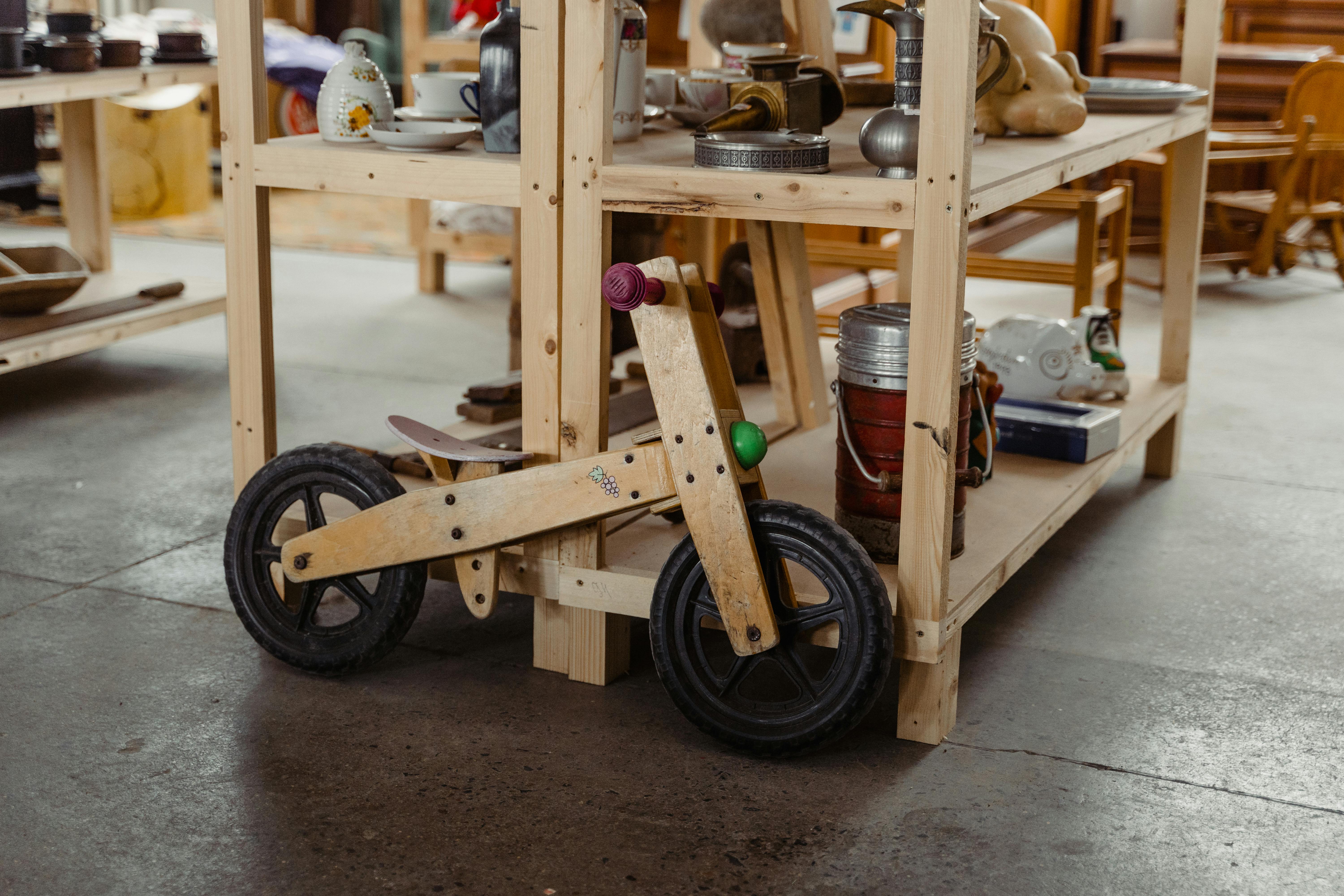Alright, so you’ve been hitting up those thrift stores, rummaging through dusty shelves, and maybe even snagging a few good finds here and there. But let’s be real, everyone and their grandma is doing the same thing. The competition is fierce, the good stuff gets snatched up instantly, and sometimes, you walk out feeling like you just wasted an hour of your life. Been there, done that, got the t-shirt (probably found it at a thrift store, actually).
But what if I told you there’s a whole world of hidden treasures right under your nose, practically begging to be found? We’re talking about hyper-local sourcing – diving deep into your own community to unearth inventory that most resellers don’t even know exists. This isn’t just about finding cool stuff; it’s about getting unique items, sidestepping the crazy competition, and boosting your profit margins like crazy. Think of it as being a detective for forgotten treasures, right in your backyard.
I’ve been in the reselling game for a while, and let me tell you, the thrill of finding something amazing that no one else spotted is addicting. It’s not always glamorous; sometimes it involves sifting through boxes of forgotten junk or showing up early to a rummage sale when it’s still cold and misty. But the payoff? Totally worth it. It’s like hitting a mini-jackpot with every truly unique find. These are the strategies that have honestly transformed my own sourcing game from a tired hunt to an exciting treasure map.
Ready to level up your reselling hustle? Let’s dive into nine hyper-local sourcing secrets that will change how you see your community.
1. School’s Out (for Rummage Sales, Not for You!): Engage with Local School Fundraisers and Rummage Sales
Okay, picture this: a school gymnasium, maybe a church hall, packed with tables piled high with… everything. Old books, forgotten toys, a surprisingly decent vintage lamp, even some barely-used sporting equipment. This isn't just chaos; it’s a goldmine.
Schools and parent-teacher organizations are always looking for ways to raise a buck, and one of their go-to methods is the good old-fashioned rummage sale or fundraiser. What’s in it for you? A treasure trove of donated goods from local families. We’re talking items that are usually well-cared for, eclectic, and often, stuff you won't see polluting the shelves of your big-name thrift chains.
I remember one time, a few years back, I was at a small elementary school fundraiser. It was a drizzly Saturday morning, and most people were still nursing their first cup of coffee. I wandered into the chaos, and in a forgotten corner, tucked away behind a pile of board games, I spotted it: a vintage, seemingly unused, cast iron skillet. Not just any skillet – a Griswold. If you know, you know. It was marked for five bucks. Five. Dollars. I practically skipped to the checkout. Within a week, it was cleaned up, listed, and sold for well over a hundred. That’s the kind of magic school sales can conjure.
How to find them:
- Keep an eye on local school websites, community calendars, or even neighborhood bulletin boards (the physical kind!). Sometimes, flyers pop up at local coffee shops or libraries.
- Get there early; the early bird gets the perfectly seasoned cast iron skillet.
2. Holler at the Hallo (and Other Holy Places): Attend Church Bazaars and Community Markets
Similar to school fundraisers, churches and other community organizations are masters of the bazaar. These events are often more curated, with a mix of donated goods, handmade crafts, and sometimes even a dedicated section for antiques or collectibles. People tend to donate higher-quality items to these, feeling like they're contributing to a good cause.
I’ve had great luck at church bazaars, especially those held in older, more established neighborhoods. People who have lived in the same house for decades, accumulating interesting items, often decide to downsize and donate their treasures to these sales. I snagged a beautiful, intricately carved wooden chess set at a church bazaar once. It was unique, clearly handmade, and the parishioners running the sale just wanted it to go to a good home. It wasn’t cheap, but it was fair, and I knew its true value. It sold quickly to a collector who appreciated the craftsmanship.
How to find them:
- Check church newsletters, local community event listings online, and even local newspaper classifieds (yes, they still exist!). These are often seasonal, so keep an eye out in spring and fall.
3. Your Neighborhood’s Digital Bulletin Board: Join Neighborhood Facebook Groups for Local Sales
This is where the digital world meets hyper-local sourcing. Almost every community, big or small, has a Facebook group (or five) dedicated to local sales, swapping, or just giving stuff away. These aren't like Marketplace where you’re competing with hundreds of users; these are often more intimate, trusted communities.
People post everything from furniture they need to get rid of by the end of the week to baby clothes their kids have outgrown, or even just random household items they no longer need. The beauty here is that you're dealing directly with neighbors, which often means more flexible pickup times and a higher chance of getting a great deal because they just want it gone.
I belong to a few of these groups, and I’ve scored some incredible deals. One time, a local family was moving out of state and just wanted to clear out their garage. They posted a "take it all for $50" kind of deal. I showed up, and among the usual garage sale fare, was a vintage bicycle in surprisingly good condition. It took a bit of cleaning and a minor tune-up, but it sold to a vintage bike enthusiast for a handsome profit. Being part of that group meant I saw the post within minutes of it going live and was the first to respond.
How to Find Them:
- Search Facebook for "[Your Town Name] Buy Sell Trade," "[Your Neighborhood Name] Yard Sale," or similar phrases.
- Join a few, set up notifications, and be quick on the draw when something good pops up.
- Remember to be polite and professional in your interactions.
4. The University Undercarpet: Leverage University Move-Out Days
If you live near a college or university campus, mark this strategy down in bold, flashing letters. University move-out days are absolute chaos – in the best possible way for resellers. Students, especially those moving out of dorms, often have a ton of stuff they simply don't want to pack up and haul back home. We’re talking furniture, mini-fridges, electronics, textbooks, decor, kitchenware… you name it.
They’re usually under pressure to clear out their rooms by a certain deadline, which means they're highly motivated to get rid of items, often for free or next to nothing. I've seen perfectly good lamps, small desks, and even gaming consoles sitting by dumpsters during these times. It’s a bit of a scavenger hunt, but if you’re strategic, you can walk away with a carload of inventory.
My personal best from a university move-out? A pristine, professional-grade drafting table that was just sitting outside a fine arts dorm. I think the student just didn't want to disassemble it. It was heavy, a beast to move, but I knew its value. A quickly listed ad online and it was gone to an architecture student looking for a deal.
How to find them:
- Check the academic calendar for local universities – move-out dates are usually around late spring/early summer.
- Be discreet and respectful of private property.
- Focus on areas near dorms and off-campus student housing.
5. The Road Less Traveled: Explore Lesser-Known Estate Sale Companies
Estate sales can be amazing for sourcing, but the popular ones? Forget about it. You’ll be elbow-to-elbow with professional dealers, all vying for the same mid-century modern credenza. The secret? Go for the lesser-known estate sale companies.
These small, often family-run businesses might not have the glitzy marketing, but they often handle estates in less affluent areas or from families who aren't quite as plugged into the mainstream market. This means less competition and a higher chance of finding truly unique, sometimes overlooked, items.
I once followed a tip from a local antique dealer about a small estate sale company that was relatively new. Their sales weren't advertised widely, mostly by word of mouth and a tiny ad in a local paper. At one of their sales, in a house filled with what looked like generations of accumulated items, I found a box of old, dusty postcards. Not just any postcards, but early 20th-century, rare real photo postcards (RPPCs) depicting local historical events. They clearly had no idea what they had. I paid pennies for them, and each individual card later sold for a significant amount to collectors specializing in local history. It really pays to dig beyond the obvious.
How to find them:
- Don't just check the big online estate sale directories.
- Look for smaller, local classifieds, or ask at local antique shops if they know of any new or emerging estate sale liquidators.
- Sometimes, a quick Google search for "[Your Town] estate sales" will bring up smaller operations further down the results page.
6. Artisan Overstock: Visit Local Artisan Markets with Overstock
We often think of artisan markets as places to buy unique, handmade gifts. And they are! But for the savvy reseller, they can also be a goldmine for inventory. Local crafters and artists, especially those just starting out or moving to a new season of products, often have overstock. They might have made too many of a particular item, or they're discontinuing a line, and they just want to move it.
This is your chance to snag unique, high-quality, handmade items at a wholesale or discounted price. These items often appeal to niche markets online – think Etsy, or specialized craft forums. Plus, you’re supporting a local artist, which feels good.
I once approached a potter at a local craft fair who had about a dozen beautiful, slightly imperfect ceramic mugs (think minor glaze flaws, nothing major). She was practically giving them away because she couldn't sell them at her usual retail price. I bought the whole lot, cleaned them up, photographed them beautifully, and listed them as "rustic, imperfect ceramic mugs" emphasizing their unique, handmade quality. They sold out within days to people who loved the rustic charm.
How to find them:
- Look for local craft fairs, farmers' markets that include artisans, and holiday markets.
- Don't be afraid to strike up a conversation with the artists and politely ask if they have any "seconds" or overstock they're looking to offload.
- Building a relationship can lead to future bulk deals.
7. Charm of the Small Town: Source from Small Town Consignment Shops
Large, urban consignment shops can be picked over quickly. But head out to a smaller, quieter town, and you might find a different story. Small town consignment shops often have less foot traffic and different inventory. People in smaller communities tend to consign a wider variety of items, and often, things that have been in families for generations.
These shops might have vintage clothing that’s been untouched for years, unique home decor, antique furniture, or even rare books. And because the pace is slower, you have more time to browse and really dig for those hidden gems. Building a relationship with the shop owner or manager in a small town can also be an advantage; they might give you a heads-up when new, interesting items come in.
I was driving through a tiny town in upstate New York once, just randomly, and spotted a quaint little consignment shop. It looked like it hadn't changed in fifty years. Inside, among dusty trinkets, I found a collection of old, hand-painted wooden duck decoys. They were clearly folk art, unique and charming. The shop owner told me they’d been there for ages. I bought them for a song, did a little research, and learned they were from a well-known local artisan from decades past. They sold for a great price to a collector of folk art.
How to find them:
- Take a day trip! Explore small towns a bit outside your usual radius.
- Use Google Maps to search for "consignment shops" or "antique shops" in those areas.
- Don't be afraid to pull over if something looks interesting.
8. Local Business Partnerships: Collaborate with Local Businesses for Overstock Items
This is a more strategic and long-term approach, but it can be incredibly lucrative. Think about local businesses in your area: bookstores, small boutiques, gift shops, even hardware stores. Sometimes, they end up with overstock, discontinued items, or even slightly damaged goods they can’t sell at full price. Instead of liquidating it themselves or holding a massive sale, they might be open to selling it to a reseller at a discounted rate.
The key here is building a relationship. Go into these stores, introduce yourself, explain what you do, and ask if they ever have items they need to clear out. You’re offering a solution to their problem: getting rid of excess inventory without heavily discounting it themselves or taking up valuable shelf space.
A friend of mine who specializes in reselling unique home goods once established a relationship with a local boutique that was closing out a specific line of candles and diffusers. The boutique needed them gone to make space for new inventory but didn't want to deeply discount them in-store. My friend bought the entire remaining stock at a very favorable price, and since the items were high-quality and unique, she was able to sell them online at a healthy profit, offering her online customers a product they couldn’t find elsewhere.
How to find them:
- Walk around your local downtown area or strip malls.
- Identify independent businesses that sell goods.
- Start with the smaller ones, as they might be more amenable to this kind of partnership than large chains.
- Be professional, explain clearly how you can help them, and be ready to negotiate.
9. Digging in the Digital Dirt: Utilize Local Online Marketplaces and Apps
We've already talked about Facebook groups, but there's a whole digital ecosystem out there dedicated to local buying and selling. Platforms like Nextdoor, local Craigslist sections, and even specific local apps are a goldmine. These are places where individuals, just like your neighbors, post items they want to sell.
The beauty of these platforms is the direct-to-consumer aspect. People are often just looking to get rid of items quickly, sometimes for very low prices, or even for free if they just want it gone. You can set up alerts for keywords, browse new listings constantly, and often arrange for quick, local pickups.
I’ve had great success with Craigslist for larger items. I needed a new work desk for my home office, but I also wanted one I could potentially resell later if I upgraded. I checked Craigslist daily and found someone listing a sturdy, executive-style wooden desk in excellent condition for fifty bucks. It was too good to pass up. I picked it up, used it for a year, and when I upgraded, I flipped it for a cool $100 profit. It’s all about spotting the value where others just see a functional item.
How to find them:
- Download the Nextdoor app and set your location.
- Regularly check the "For Sale & Free" section.
- For Craigslist, go to the website and select your local city.
- Filter by "for sale by owner" and browse frequently, especially the "free" section.
- Be vigilant, and safe, when arranging pickups. Always meet in a public place if possible, especially for new contacts.
Time to Ditch the Thrift Store Rut
So, there you have it. Nine ways to bypass the usual suspects and tap into a rich vein of unique inventory right in your own community. This isn't about ditching thrift stores entirely – they still have their place. But by expanding your horizons, by getting a little creative and truly exploring the hyper-local opportunities around you, you're not just finding more stuff; you're finding *better* stuff. You’re finding things that fewer people are looking for, which means less competition and usually a higher profit margin for you.
It takes a bit more effort, a little more legwork, and definitely some early mornings, but the rewards are well worth it. You build connections in your community, you uncover stories behind the items, and you become a true expert at spotting value where others simply see clutter. So, next time you're thinking about your next sourcing trip, skip the crowded parking lot of the big box thrift shop and start looking closer to home. Your next hidden gem might just be a block away. Happy hunting!



